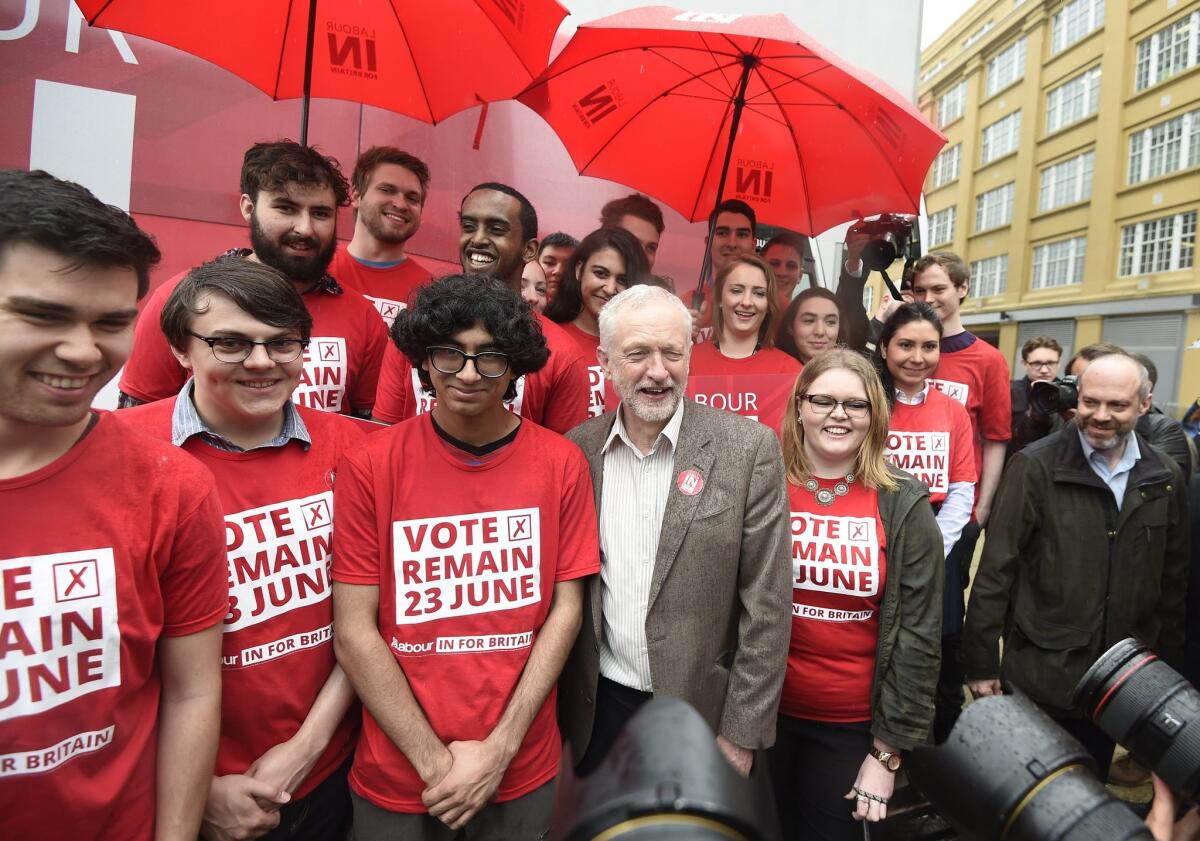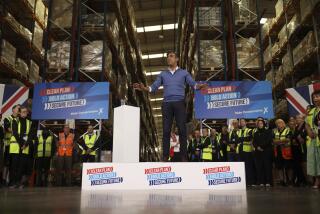Britain’s vote on whether to remain in the European Union may rank as its most important decision in decades
As Britain gears up to vote on whether to leave or stay in the European Union, the debate is becoming increasingly bitter and personal.
Words like “catastrophe” and “chaos” are constantly bandied around by supporters of the “Remain” camp, led by Conservative Prime Minister David Cameron, to paint a doomsday scenario of what life would look like outside the EU.
Meanwhile, “Leave” campaigners relentlessly accuse their opponents of conspiracies and a “cynical distortion” of the truth.
See more of our top stories on Facebook >>
The outcome of a June 23 referendum is expected to have far-reaching consequences not just for British citizens, but the European continent and the world. The 28-nation partnership began after World War II to generate economic cooperation and avoid war, but some in Britain want their independence.

Labor Party leader Jeremy Corbyn stands with vote “remain” supporters in London on May 10, 2016, during the unveiling of a campaign bus for the upcoming referendum on the European Union.
For many of those who want to leave the EU, the issue comes down to Britain’s ability to control its own economy, laws and immigration policy without having to adhere to European Union rules and regulations. Some describe the outcome of June’s vote as the most fundamental moment facing Europe since the fall of the Berlin wall in 1989.
As a result, the list of business and world leaders, economists, scientists and celebrities who have weighed in is long.
Renowned professor Stephen Hawking said it would be a “disaster for U.K. science” for Britain to leave the EU, while President Obama warned Britain would be put to the “back of the queue” in trade talks. The president of the World Bank, Jim Yong Kim, said a “Brexit” — as the campaign is known — would have a worrying impact on developing countries whose growth depends in part on stronger nations. Some observers say an exit could result in a recession in Britain.
NEWSLETTER: Get the day’s top headlines from Times Editor Davan Maharaj >>
Film stars have weighed in, with Benedict Cumberbatch and Keira Knightley among the actors who signed a letter saying Britain would become an “outsider shouting from the wings” if it were to leave the EU.
The “Leave” campaign has been criticized for failing to adequately explain what post-EU life would look like, but a recent YouGov poll showed the vote was neck and neck.
During an EU referendum debate Thursday night in the posh London neighborhood of Kensington, a 200-strong audience gathered to hear for themselves both sides of the argument.
“I came here thinking I would vote to remain, and now I’m undecided,” said June, a local retiree who declined to give her full name. “This isn’t Europe we are talking about, it’s the European Union. That’s terribly important to understand. But I don’t think we can be separate and still work together anymore. I think life has changed.”
Younger British voters, who have always known the luxury of being able to travel to Spain, study in France and work in Germany without needing visas or work permits, are more likely to vote to stay in, polls show.
Older voters are more inclined to favor leaving the partnership and often place sovereignty at the heart of their argument, polls show.
Conservative politician and “House of Cards” author Lord Michael Dobbs draws that comparison too, but not because he fears the return to a fragmented, distrustful pre-World War II Europe. For him, this vote signifies all the ways that the EU has failed since 1989.
“We’ve become weak. We’ve become inward looking. We’ve lost focus on those values and democratic values that millions of people tore down that Berlin Wall to get,” he said, taking up the podium during the EU debate in Kensington.
Many “Leave” campaigners point to the dire economies of Greece, Spain and Italy as a sign that Britain would be stronger forging forward on its own. They also oppose the practice of EU citizens freely traveling and working in Britain, a form of uncontrolled immigration that opponents claim is ludicrous given the already over-burdened welfare state, housing shortage and economy that is still struggling to rebuild after the financial crisis.
“Ask yourselves a question: Would you vote to join now?” Dobbs asked the audience. “If you wouldn’t, then seize the opportunity to vote out.”
One of his debate opponents, Labor’s Liz Kendall, said it is insightful that Russian President Vladimir Putin and France’s far-right politician Marine Le Pen favor a British exit, and this is not the time to play into their hands.
“The world is a complex, difficult, nasty place. We don’t deal with it by simply withdrawing. You deal with it by trying to engage with our allies in Europe and the United States in the Middle East,” she said. “Let’s use everything we’ve got to try and tackle the problems and not think there’s some kind of simple solution because there isn’t.’ ”
The campaign to leave appeared to receive a boost Thursday when immigration figures released by the Office for National Statistics showed that net migration to Britain rose 333,000 in 2015, the second highest figure on record. This relates to the number of people, both EU and non-EU citizens, who came to Britain for more than a year, minus the number of British citizens who left. The net migration figure for EU citizens was 184,000.
“You need to be able to say to people from Australia: ‘Yes, we want your brilliant paramedics,’ or to India: ‘Yes we want your fantastic engineers’ or Chinese students,” said Conservative member of parliament Boris Johnson, the former London mayor who is spearheading the “Leave” campaign.
“But it’s crazy when we’re pushing those people away and have absolutely no control over huge numbers coming from the [28 EU member states]. That is one of the fundamental things a state should be able to do.”
Polls show Scotland, whose voters in 2014 rejected independence from Britain, is overwhelmingly in favor of remaining in the EU. Leading figures in the Scottish National Party have warned that a Brexit might spark a second campaign for Scottish independence.
Bookmakers are still betting on Britain staying in the EU, but both sides know the undecided votes are still very much in play.
“The sense is, across the country, that provided nothing unanticipated happens, it should just about be a vote to stay in,” said Iain Begg, professorial research fellow at the European Institute at the London School of Economics. “But that leaves the unexpected, the unknown unknowns —: a terrorist attack, something like the Panama Papers. It doesn’t take a lot to sway voters the other way.”
ALSO
Ukraine’s first female combat pilot freed in prisoner exchange with Russia
Nations with poor human rights records block U.N. status for press-rights group
France faces major challenge as activists step up protests over bill loosening labor protections
Boyle is a special correspondent.
More to Read
Sign up for Essential California
The most important California stories and recommendations in your inbox every morning.
You may occasionally receive promotional content from the Los Angeles Times.









